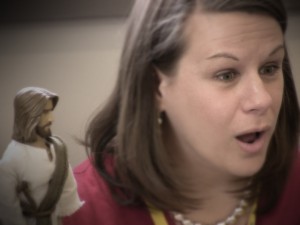The Three Components of Learning
Part Three
Evaluation
Proverbs 27:23 says, “Be sure you know the condition of your flocks, give careful attention to your herds†(NIV). The educational ministry of the church must have a master plan, which has clearly defined objectives. Those objectives can then be used to measure effectiveness. For the teacher each lesson should have clear objectives that are outlined for the student to learn. This is the first and most important way of evaluating teaching effectiveness. A simple way of establishing teaching effectiveness is simply to ask the students what they learned and how they plan to apply this knowledge to their lives. Another evaluation tool is to gather the leadership over a specific section of education and ask them the effectiveness of the teaching in their areas. Perhaps the greatest weakness of most Christian educational departments within the church is that they operate on a week-to-week basis with regard to the teaching. Many times the teacher will look at this comings Sunday’s lesson during the week but look no further. They lack written objectives or goals in which to evaluate if the students are learning. This becomes an even greater problem if teachers rotate as part of a teaching team. In this situation, one teacher may not even know what was taught the week before her lesson, or what the next week’s lesson will cover.
Now that the lesson has been taught, is the work of the teacher over? No. Gregory says in his “Law of review and application,†that the chief aim of the teacher at this point is “to perfect knowledge, to confirm knowledge, and to render this knowledge ready and useful.â€[1] The material that has been taught, in order for it to have the most impact, must be reviewed. Review, however, is more than repetition; it is guiding the student back through the thought process that was taken earlier. Even in these times of review new thoughts may be discussed, or new questions may arise. This is especially true of a study of Scripture. Learning theory demonstrates that persons can only recall Bible facts, ideas, and concepts when they understand what is being taught and when the facts, ideas, and concepts are systematically reviewed.[2] It, therefore, is only as the teacher goes back and reviews previous lessons that Bible information is retained. When a lesson is reviewed it is like stacking information. However, in order for the teacher to know what to review, he has to know the big picture is. This explains the importance of master planning.
It has been said that “the unexamined life is not worth living.†But this can also apply to an unexamined ministry. A teacher could go years, if not his whole teaching ministry, making little impact for God’s kingdom. If he had only periodically evaluated how effective he had been, it could have been radically different. Hendricks says that “experience does not necessarily make you better; in fact it tends to make you worse, unless it’s evaluated experiences.â€[3] The teacher has to evaluate periodically the methods he is using to determine if they are effective. Oftentimes one does not evaluate because one is afraid of what one might discover. The teacher may have to change what he has always done in the classroom. He may have to try new things that may be risky or make him feel uncomfortable.
The final step in the teaching process is for the student to teach others. Paul explains it this way, “And the things you have heard me say in the presence of many witnesses entrust to reliable men who will also be qualified to teach others†(2 Tim 2:2 NIV). Eldridge explains that having the student become the teacher accomplishes three things. First, the teaching is reinforced in the life of the original student. He says, “Expressing an idea in a way that others can understand increases the teacher’s comprehension.â€[4] Second, when the original student teaches material to a third person, it helps to make concrete the original student’s beliefs. When the teacher has to defend his teaching and knows that he may be questioned as to how he knows what he is teaching is true, he is encouraged to dig deeper himself. Third, having a student become a teacher, the original teacher’s ministry is multiplied (2 Tim 4:12). Jesus did this when He sent the disciples off to share the gospel (Matt 6:7–13). Luke 6:40 says, “. . . everyone who is fully trained will be like his teacher†(NIV). The teacher has to constantly be aware that his students (if he is effective) will be like him. In order for this model to be effective, the teacher must be like Christ. While no one is worthy to be a teacher of Scripture, one must make sure that he is doing all that he can to live up to this awesome responsibility and calling. Jesus sets the example, and is the watermark for the Christian educator to follow. Teachers should “press on†to become transformational teachers.
[1] Gregory, The Seven Laws of Teaching, 116.
[2] Dale, Changing Lives or Spinning Wheels, 29.
[3] Hendricks, Teaching to Change Lives, 33.
[4] Eldridge, The Teaching Ministry of the Church, 83.